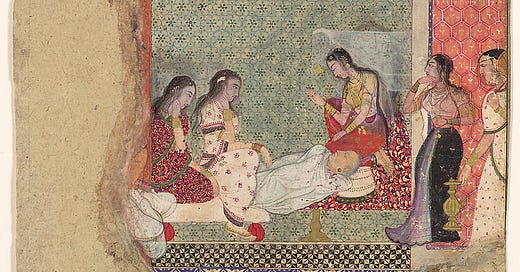
The King's life slowly ebbed away, his heart broken at the departure of R.
Meanwhile, Prince B. returned from his errand in the following days and observed that a pervasive gloom had descended upon the kingdom. He had been summoned back upon receiving news of his father's death. As he rode up to the Palace, people stared at him in dismay, and he was surprised by the darkness of their glances.
He dismounted and went straight to his mother to apprise her of his errand.
On meeting her, he noticed she was in mourning clothes, but her face shone with excitement as she eagerly shared the news of his impending coronation as King.
The moment he heard that he was to be King, he cried out aloud, fervently wishing he had died before he heard such a pronouncement from his mother.
To be crowned in place of his brother, who was righteousness personified on Earth—what evil news was this?
He then inquired, "But what about R.?"
It was then that the Queen, who believed this was her masterstroke, told him that he needn't worry about R. and the people's reaction because she had ensured all barriers to his reign were removed. She then detailed all that had transpired.
B. fell back, staggered. Exile for his brother and the Crown for him?
He lamented loudly, "What sins have I committed, that I must be born to such a wicked mother, who thought not of whether her son was worthy, but only of her selfish desire. She has banished the best of all men on Earth to the forest to benefit her son. What sins have I committed to deserve this ignominy? That I must be the cause of such grief, such sorrow, the reason for my beloved brothers and sister-in-law to be in exile, my father dead, and the people in darkness."
He exclaimed aloud repeatedly at his fate that placed him not at the scene of this evil plan but far away, where he could not prevent it.
He railed at this wicked plan of his mother and interrogated her as to how she had turned against R. Was R. not also her son? How did she now see this difference between R. and himself?
He demanded answers.
"What happened to your mother’s heart?" he asked, puzzled. "What about Queen Kaus?” Had you no thought of what must be the condition of Queen Kaus to have to bear the exile of her beloved son and the death of the King? What of Queen Sumi’s state, to lose her son, and what of his new wife, to lose her husband thus?"
“What of that delicate flower, Princess S., the gentlest and kindest person in the whole world, who never knew anything but the comforts of the Palace, whom R. married with such fanfare and promised to protect? Is she to live in the forest, wear bark, and walk barefoot?”
Is this what his mother thought would make her son happy? He asked again and again. To live in palatial comfort, while his brothers and his dear sister-in-law were condemned to live in exile?
Her actions, he realized, caused the death of his father. Slowly, his sorrow turned into anger.
“How dare you?” He thundered at her, his face contorted in a way that his mother had never witnessed before.
“What evil thought is this, and how did you think I would acquiesce in such a plan?” B. asked.
Still in denial about the events he heard related to him, he was conflicted with the fact that his mother was the one to architect such a coup.
He addressed her again: “By natural rights, the throne belongs to R. and even if it didn’t by rights, it is his by worthiness. Of the four of us, he is the worthy heir, the King, and the people were aware of this, and yet, you sought to overturn this natural law and make me a party to such injustice?”
The Queen was shocked by B.’s response, and as he spoke, she began to quake in fear.
Suddenly, her veil of illusion was lifted. Her paranoid dreams were cut to pieces with the sword of her son’s lament and his piercing questions that challenged her myopic fears.
It occurred to her slowly that she had committed several follies under the influence of her wicked maid.
She began to weep, terrified of her actions, and confessed to B. the role of her maid in influencing her to think the worst of her future.
When B. discovered the source of these unholy actions, he immediately summoned the maid and banished her from the kingdom.
He informed his mother that her only redemption lay in the unlikely event that his other mothers and R. would forgive her.
For his part, he said he could never forgive her for putting into play this drama by ignoring the rules of Dharma (righteous action).
He advised her that the only path forward was for him to seek R.’s forgiveness and bring him back.
At that thought, he remonstrated, “Oh, what must my brother think of me? Does he think I also had evil in my heart? I cannot bear it if it is so. I would rather die than be thought so poorly of by my dear brother.”
He left his mother in deep fear and sorrow and went to seek the forgiveness of the Queen, R.’s mother, and L’s mother.
Does B. succeed in seeking forgiveness and bring his brother R. back? Read what happens next in Part 3:





This story is timely and very relevant for me. Thank you for sharing it. I look forward to finding out how this drama plays out...
Love how the story has developed, and am looking forward to Pt. III: Revenge of the Fungus
People! Great work, Jayshree. I'd almost prefer hearing the entire tale from the maid's perspective...